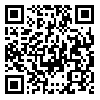Volume 11, Issue 5 (September & October - Special Issue on Cognitive Neuroscience 2020)
BCN 2020, 11(5): 669-686 |
Back to browse issues page
Download citation:
BibTeX | RIS | EndNote | Medlars | ProCite | Reference Manager | RefWorks
Send citation to:



BibTeX | RIS | EndNote | Medlars | ProCite | Reference Manager | RefWorks
Send citation to:
Batouli S A H, Saba V. Larger Volume and Different Activation of the Brain in Response to Threat in Military Officers. BCN 2020; 11 (5) :669-686
URL: http://bcn.iums.ac.ir/article-1-1279-en.html
URL: http://bcn.iums.ac.ir/article-1-1279-en.html
1- Department of Radiology, Faculty of Paramedicine, AJA University of Medical Sciences, Tehran, Iran.
Abstract:
Introduction: Military missions involve stressful and life-threatening situations; however, soldiers should have a healthy cognition on the battlefield despite their high-stress levels. This is an ability that should be gained during prior military training. Successful and influential training is suggested to be associated with structural and functional improvements of the brain.
Methods: This study investigated the pattern of brain activation while observing videos relevant to life-threatening situations, in addition to brain structure. Accordingly, the obtained data were compared between 20 military members and 26 healthy controls. The study participants were all male, aged between 19 to 24 years, right-handed, studying BSc, and from the same socioeconomic status.
Results: The obtained data presented a larger volume in a total number of 1103 voxels of the brain (in 5 brain areas) in the military group. Furthermore, the military group suggested higher brain activation in the visual processing areas of the brain when observing real combat videos; however, this increment was mostly in the areas associated with motor processing and executive functions in the controls.
Conclusion: This study indicated that military training is associated with positive structural changes in the brain. Besides, it provided a different brain activation in response to stressful situations. These findings highlighted the importance of qualified military training.
Methods: This study investigated the pattern of brain activation while observing videos relevant to life-threatening situations, in addition to brain structure. Accordingly, the obtained data were compared between 20 military members and 26 healthy controls. The study participants were all male, aged between 19 to 24 years, right-handed, studying BSc, and from the same socioeconomic status.
Results: The obtained data presented a larger volume in a total number of 1103 voxels of the brain (in 5 brain areas) in the military group. Furthermore, the military group suggested higher brain activation in the visual processing areas of the brain when observing real combat videos; however, this increment was mostly in the areas associated with motor processing and executive functions in the controls.
Conclusion: This study indicated that military training is associated with positive structural changes in the brain. Besides, it provided a different brain activation in response to stressful situations. These findings highlighted the importance of qualified military training.
Type of Study: Original |
Subject:
Cognitive Neuroscience
Received: 2019/07/13 | Accepted: 2020/01/15 | Published: 2020/09/1
Received: 2019/07/13 | Accepted: 2020/01/15 | Published: 2020/09/1
Send email to the article author
| Rights and permissions | |
 |
This work is licensed under a Creative Commons Attribution-NonCommercial 4.0 International License. |








